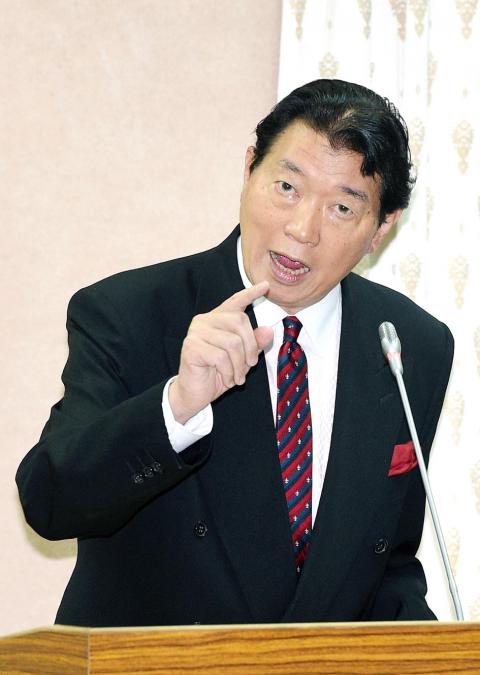Senior US government officials have made requests to President Ma Ying-jeou’s (馬英九) administration that the nation’s representative to the US Shen Lyu-shun (沈呂巡) be replaced over the controversial flag-raising ceremony at Twin Oaks Estate in Washington on Jan. 1, sources said.
Shen left Taipei for Washington yesterday, earlier than scheduled, to deal with the repercussions of the flag-raising event, sources said.
Sources said that US President Barack Obama’s administration would bypass Shen and discuss US-Taiwan business directly with the Ministry of Foreign Affairs and the National Security Council in Taipei.

Photo: Wang Min-wei, Taipei Times
The flag-raising ceremony and the conferment of medals and orders to uniformed military personnel serving in the US led by Shen has met with US reaction more severe than Shen expected.
He likely further provoked the US to make a clearer public response when he fielded questions from lawmakers earlier this week, by calling the unnamed US officials criticizing the flag-raising “nobody” and vowing to continue flying the flag on special occasions in future.
Sources said that after Shen publicly declared the New Year’s Day flag-raising ceremony as a major diplomatic breakthrough, and published a statement and pictures through the Taipei Economic and Cultural Representative Office (TECRO) in the US, the Obama administration made a seven-point statement on Monday morning disclaiming their knowledge or approval of the event.
The statement was announced by a senior official representing the Obama administration during an interview with the Liberty Times, the Taipei Times’ sister newspaper.
US Department of State spokeswoman Jen Psaki announced later the same day in a news briefing that the ceremony was “not consistent with US policy” and that the US did not know about the flag-raising in advance.
However, Shen fought back with harsh comments at the legislature, forcing the US to have the American Institute in Taiwan officially announce that Taiwan ensure that these kinds of things do not happen again, leaving no room for ambiguity for Shen or the Ma administration.
The public back-and-forths between the Taiwanese and US officials have now come to a temporary end, while closed-door negotiations continue.
Shen’s decision to fly the national flag has put the Ma administration in a bind. Since pan-blue supporters in the US and Taiwan lauded the act, replacing “patriotic ambassador” Shen would be denounced by supporters.
However, if Shen is snubbed by the Obama administration and unable to meet relevant US officials in the future, the office could be rendered obsolete, leaving Shen in a similar situation to former representative to the US Benjamin Lu (魯肇忠), who former US president Bill Clinton refused to interact with after his handling of former president Lee Teng-hui’s (李登輝) visit to the US in 1995.

DAREDEVIL: Honnold said it had always been a dream of his to climb Taipei 101, while a Netflix producer said the skyscraper was ‘a real icon of this country’ US climber Alex Honnold yesterday took on Taiwan’s tallest building, becoming the first person to scale Taipei 101 without a rope, harness or safety net. Hundreds of spectators gathered at the base of the 101-story skyscraper to watch Honnold, 40, embark on his daredevil feat, which was also broadcast live on Netflix. Dressed in a red T-shirt and yellow custom-made climbing shoes, Honnold swiftly moved up the southeast face of the glass and steel building. At one point, he stepped onto a platform midway up to wave down at fans and onlookers who were taking photos. People watching from inside

A Vietnamese migrant worker yesterday won NT$12 million (US$379,627) on a Lunar New Year scratch card in Kaohsiung as part of Taiwan Lottery Co’s (台灣彩券) “NT$12 Million Grand Fortune” (1200萬大吉利) game. The man was the first top-prize winner of the new game launched on Jan. 6 to mark the Lunar New Year. Three Vietnamese migrant workers visited a Taiwan Lottery shop on Xinyue Street in Kaohsiung’s Gangshan District (崗山), a store representative said. The player bought multiple tickets and, after winning nothing, held the final lottery ticket in one hand and rubbed the store’s statue of the Maitreya Buddha’s belly with the other,

‘NATO-PLUS’: ‘Our strategic partners in the Indo-Pacific are facing increasing aggression by the Chinese Communist Party,’ US Representative Rob Wittman said The US House of Representatives on Monday released its version of the Consolidated Appropriations Act, which includes US$1.15 billion to support security cooperation with Taiwan. The omnibus act, covering US$1.2 trillion of spending, allocates US$1 billion for the Taiwan Security Cooperation Initiative, as well as US$150 million for the replacement of defense articles and reimbursement of defense services provided to Taiwan. The fund allocations were based on the US National Defense Authorization Act for fiscal 2026 that was passed by the US Congress last month and authorized up to US$1 billion to the US Defense Security Cooperation Agency in support of the

HIGH-TECH DEAL: Chipmakers that expand in the US would be able to import up to 2.5 times their new capacity with no extra tariffs during an approved construction period Taiwan aims to build a “democratic” high-tech supply chain with the US and form a strategic artificial intelligence (AI) partnership under the new tariffs deal it sealed with Washington last week, Taipei’s top negotiator in the talks said yesterday. US President Donald Trump has pushed Taiwan, a major producer of semiconductors which runs a large trade surplus with the US, to invest more in the US, specifically in chips that power AI. Under the terms of the long-negotiated deal, chipmakers such as Taiwan Semiconductor Manufacturing Co (TSMC, 台積電) that expand US production would incur a lower tariff on semiconductors or related manufacturing